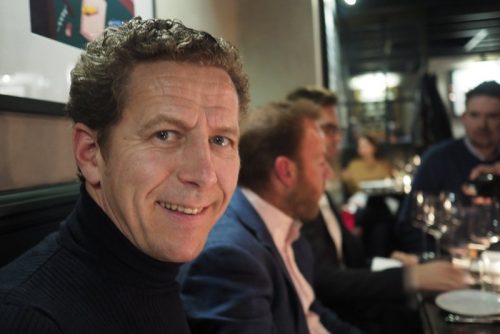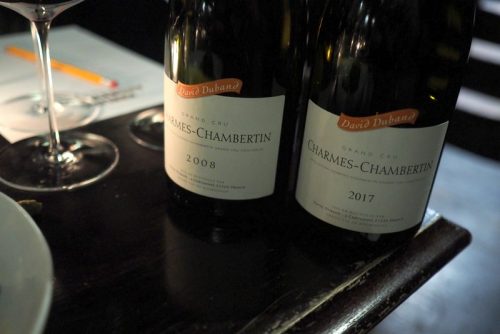
I met with David Duband over dinner at Noble Rot. He’s imported into the UK by Keeling Andrews, the agency arm with the same ownership as the restaurant. David is calm and measured, and there was a good energy to the evening as we tasted through wines and chatted.
David’s father, Pierre Duband, began as a winegrower in the Hautes Côtes, some 9 km from Nuits-St-George, in the 1960s. He started with nothing, and began planting vineyards in this rather unfashionable area. After five years he got the chance to rent some vines in Nuits-St-George, which he farmed. But for 35 years he just sold grapes.
Then, in 1991, at breakfast, he asked the 19-year-old David whether he wanted to make wine. David had finished his studied six months earlier and was in the process of doing a year’s mandatory military service. His father introduced him to François Feuillet, who had just bought a parcel in the premier cru Aux Thorey vineyard, and Feuillet asked David to work the vines and make the wines in a metayage arrangement. This is a form of share cropping, where David did the work, then gave half the wine to Feuillet, and it used to be common in Burgundy. David got permission to leave military service for the harvest in September 1991, and made 20 barrels of wine. He repeated this in 1992.
The arrangement suited both parties, and Feuillet bought more vineyards. His father retired in 1994 and David took over. He stopped using herbicides in 1999, and in 2006 converted to organics (Biogro certified). ‘Everything was very difficult with my father,’ he says. ‘When you sell the grapes you don’t want to do the work in the vineyard.’
David also buys grapes. ‘When I buy grapes, I sometimes do organic treatments, and I do the harvest,’ he says. He says it is also easy to buy organic grapes now, because lots of people are farming this way. 13-14% of Burgundy is now farmed organically, and a further 18-20% is farmed without herbicides. He thinks it’s important to be organic. ‘It is necessary. It is possible [to farm organically] for 99.9% of the vintages. We cant continue with the chemicals.’
Feuillet continued to buy more vineyards, and gave them to David to work, with the same metayage arrangement. A big step forward for Duband was when Feuillet bought the domaine of Jacky Truchot, who was retiring. This consisted of 7 hectares of vines that were mostly Grand and Premier crus.
David Duband’s winemaking style has changed. ‘The 1990s was the time of the new vinification,’ he says. People destemmed and did long cold soaks to make deeper-coloured wines. But in 2006 David tried some whole cluster, and stopped the cold soak. He liked the results. ‘I tasted lots of old wines from great producers, and then I tasted my wines: they were monolithic. So I started using stems.’ Now he’s using 50-60% stems for the village wines, 75% for the premier crus, and 90% for the grand crus. ‘The maturity of the stems is not important,’ he says. ‘It is when you cut the stems you extract bitterness, so we do pigeage by foot.’ His wines see about 30% new oak.
He also commented on the most recent vintage. ‘2018 was a special vintage in the Côtes de Nuits,’ he says. ‘It was a very warm vintage, and some people started picking on the 11th September. It takes at least 9 days to do the harvest and some wines came in at 15% potential alcohol.’

THE WINES
David Duband Vosne Romanée 2016 Burgundy, France
There’s a slight chocolatey, spicy edge to the nose. Shows lovely structure under the sweet cherry and plum fruit. Tight wound with nice structure and some richness, with grainy detail. 93/100
David Duband Gevrey Chambertin 2017 Burgundy, France (cask sample)
Sweet seductive black fruits here, with some cherry richness. Supple with sweet, pure fruit. Generous and fine grained with some grip and nice acid and tannin. Has potential. 93-94/100
David Duband Gevrey Chambertin 2012 Burgundy, France
This wine has a lovely tension, with fresh red cherry fruit and a hint of undergrowth. Nice sappy green hints with some earth and mineral notes, as well as good structure. 94/100
David Duband Morey St Denis 2009 Burgundy, France
Black cherry and spice on the nose. Vivid and dense with some grip and focus. Sweet and grippy with herbs and mineral and some liquorice. Very fine. 94/100
David Duband Nuits St Georges 1er Cru Les Pruliers 2017 Burgundy, France (cask sample)
Some roast coffee and spice on the nose with black cherries, herbs and some sweet fruit, but also good structure. Nice weight with lots of potential. 93-95/100
David Duband Nuits St Georges 1er Cru Les Proces 2014 Burgundy, France
Very smooth and spice with a meaty edge to the nose. The palate is vivid and structured with black cherry and blackcurrant fruit. Dense and structural, and quite lovely. Massive potential: Grand Cru quality. 95/100
David Duband Gevrey Chambertin 1er Cru Les Combottes 2014 Burgundy, France
This is fine and fleshy, yet structured. Shows sweet cherry, plum and raspberry fruit. Fresh and structured with nice grip and focus, but also with flesh and some succulent red fruit character. 95/100
David Duband Charmes Chambertin Grand Cru 2017 Burgundy, France (cask sample)
Elegant and sweetly perfumed black cherry nose. The palate is sweetly fruited and polished, with concentrated black fruits to the fore. Grainy and mouthfilling with lovely sweet fruit. 94-96/100
David Duband Charmed Chambertin Grand Cru 2008 Burgundy, France
Complex, aromatic, spicy nose showing raspberries, red cherries, herbs, spice and pepper. Concentrated, bright and textural in the mouth with fine red and black fruits and a juicy, fruity quality. Pure and complex with nice linear fruit and some finesse. 96/100
UK agent Keeling Andrew & Co.
Find these wines with wine-searcher.com
Leave a Comment on The wines of David Duband, Burgundy